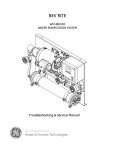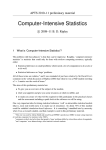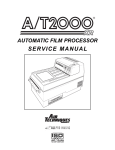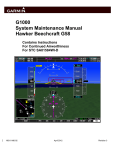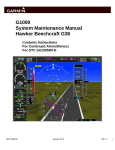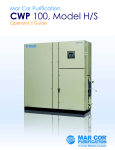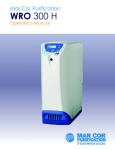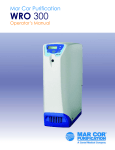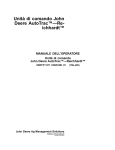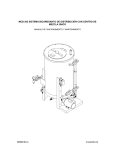Download Mar Cor Purification M4-2200 Specifications
Transcript
M4-SERIES WATER PURIFICATION MACHINES M4-2200 – M4-13200 Operation and Maintenance Manual 1238160 Rev. D 23May11 This page intentionally left blank 1238160 Rev. D 23May11 OPERATION AND MAINTENANCE MANUAL M4-SERIES WATER PURIFICATION MACHINES M4-2200 – M4-13200 TABLE OF CONTENTS Page 1-1 CHAPTER ONE: GENERAL INFORMATION Section General Information and Principles of Operation Machine Nomenclature Machine Permeate Quality Materials and Features Specifications for M4-Series Machines 1-7 1-7 1-7 1-8 CHAPTER TWO: INSTALLATION 2-1 Section Mounting Plumbing Electrical 2-3 2-3 2-4 CHAPTER THREE: PREPARATION AND START-UP 3-1 Section Pretreatment for Water Purification Start-Up 3-3 3-4 CHAPTER FOUR: OPERATION AND MAINTENANCE 4-1 Section Daily Log Sheets Prefilter Flushing Cleaning Sepralator Replacement 4-3 4-3 4-4 4-4 4-7 1.1 1.2 1.3 1.4 1.5 1238160 Rev. D 2.1 2.2 2.3 3.1 3.2 4.1 4.2 4.3 4.4 4.5 A 1-3 23May11 CHAPTER FIVE: OPTIONAL ACCESSORIES 5-1 Section Level Controls Conductivity Meter Autoflush Filters and Water Softeners 5-3 5-3 5-3 5-5 CHAPTER SIX: TROUBLESHOOTING 6-1 APPENDIX A: RETURN MATERIAL AUTHORIZATION (RMA) PROCEDURE 1238160 Rev. D 5.1 5.2 5.3 5.4 B 23May11 M-Series Water Purification Machines M-Series Water Purification Machines M4-2200 – M4-13200 CHAPTER ONE: DESCRIPTION 1238160 Rev. D 1-1 Description M-Series Water Purification Machines This page intentionally left blank. 1238160 Rev. D 1-2 Description M-Series Water Purification Machines 1.1 General Information and Principles of Operation These instructions give operating and maintenance details vital to the sustained performance of the machine. Reverse Osmosis (RO) is the removal of ionic, organic, and suspended impurities from water by means of a membrane. Unlike a filter (“normal” filtration), the feedwater or solution is separated into two streams by collecting fluids from both sides of a pressurized membrane (“crossflow” filtration). A semipermeable RO membrane, under sufficient pressure, allows passage of purified water while rejecting and concentrating dissolved and suspended solids. Mar Cor Purification manufactures a patented spiral-wound membrane package, with a turbulent flow design. The membrane module (i.e. sepralator), also called an element collects the purified water within a central tube (permeate tube), see Figure 1. Some operating definitions are provided to help you further understand your machine: PERMEATE RATE (PRODUCT WATER RATE) [QP] This is the flow rate of purified water which has passed through the membrane and out of the sepralator; expressed in gal/min (gpm) or gal/h (gph) [in metric, liter/min (Lpm) or cubic meters/hour (m3/h). Specified permeate rates are normally specified at 77°F (25°C). 1238160 Rev. D 1-3 Description M-Series Water Purification Machines CONCENTRATION Concentration equals the Total Dissolved Solids (TDS) concentration of a solution expressed as milligrams per liter (mg/L) or conductivity (microSiemens/cm). Cf Cp Cc Cavg = = = = Feed Concentration Permeate Concentration Concentrate Concentration Average Concentration in machine SALT (IONIC) REJECTION: This equals the percent of dissolved salt rejected by the membrane, calculated from an average concentration over the membrane. SALT (IONIC) PASSAGE: This equals (100% - rejection) or the percent of dissolved salts passed through the membrane. CONCENTRATION RATE (WASTE WATER RATE) [Qc]: This is the flow rate of water stream containing rejected solids to drain in gpm or gph (pm or m3/h). FEED RATE [Qf]: This is the flow of incoming water in gpm or gph (Lp or m3/h). Feedwater rate equals permeate rate plus concentrate rate. An example of how to calculate salt rejection and recovery is given below: 1238160 Rev. D 1-4 Description M-Series Water Purification Machines Given the system case in Figure 2: Average Concentration (Cavg) = (Cf) 100 mg/L + (Cc) 146.9 mg/L 2 (Cavg) = 123.5 mg/L TDS Rejection = (Cavg) 123.5 – (Cp) 6.2 x 100 = 95% (Cavg) 123.5 Passage = (Cp) = 6.2 x 100% = 5.0% (Cavg) 123.5 Recovery = (Qp) 2 gpm x 100 = 33% (Qf) 6 gpm FLOW DESCRIPTION: The feedwater passes through a replaceable 5-micron cartridge filter, which removes bulk suspended solids. Filtered water then flows to the inlet control valve. This solenoid-controlled diaphragm valve is wired to the on/off switch and opens when the machine is turned on allowing water to flow to the pump inlet. When the machine is turned off, the valve closes, preventing non-turbulent flow through the sepralators, that would lead to shortened membrane life. The pump feeds water to the sepralator housings arranged in parallel and serial combinations. An arrow on each element housing indicates the direction of water flow. The water is sepralated by the membrane within the elements and leaves the housings in two streams as permeate and concentrate. Permeate from each sepralator housing is collected in a common manifold. A pressure relief valve is installed to alleviate excessive backpressure build-up. The permeate then flows through a flow meter and to the outlet point of the machine. The concentrate leaves the last sepralator housing and flows to the flow control center. At this point, the recycle valve channels a predetermined amount of concentrate into the pump inlet. This achieves more efficient water recovery while maintaining adequate crossflow through the sepralators. The other two ports of the flow control center lead to the concentrate valve and final pressure gauge. The concentrate valve has three functions: It controls the amount of concentrate flowing to the drain; it controls the pressure within the machine, and it helps control the system recovery. An optional autoflush solenoid is added to the flow control center with an additional tee. The concentrate then flows through a flow meter and to the outlet point of the machine. 1238160 Rev. D 1-5 Description M-Series Water Purification Machines Typical P&ID 1238160 Rev. D 1-6 Description M-Series Water Purification Machines 1.2 Machine Nomenclature M-Series water purification are numbered in such a way as to indicate the permeate flow and quality you can expect from the machine. Example: M4-6600, 208, 6, 50-75 • M4 indicates the machine series • 6600 indicates the rated permeate flow in gallons per day • 208 indicates motor voltage • 6 indicates 60 Hz • 50-75 indicates the % recovery capability of the RO 1.3 Machine Permeate Quality The permeate rejection performances are as follows: M-Series machines use high rejection FASTEKu S4040 membrane, providing the ultimate in high purity water. 1.4 Materials and Features M-Series water purification machines have all the features necessary for safe, continuous production of high purity water. Also, the M-series RO contains an array of useful features for monitoring and data collection to help prolong membrane life. This assumes good quality feedwater, adequate pretreatment and regular operator attention, each shift or daily, to the operation of the system. • • • • • • • • • • • 50% or 75% recovery Multi-stage centrifugal pump, SB construction (nickel-plated cast iron castings, Noryl* stages, remainder stainless steel) typically not recommended for operation below pH 5.8 Base model electrical package includes NEMA-4X enclosure with a 115 VAC, 60 Hz or 230 VAC, 50Hz single-phase control circuit. Automatic inlet shutoff valve Pre-filter, post-filter, primary, and final pressure gauges Concentrate and permeate flow meters Gauges, valves, and rigid plumbing of stainless steel, brass, or plastic Membrane element housings, all 304 stainless steel, with PVC end caps 316 stainless steel concentrate and recycle valves All components in contact with the purified water (permeate) are either non-leachable acceptable plastic (nylon, Noryl, polypropylene, PVC) or stainless steel materials All high pressure fittings are 304 stainless steel 1238160 Rev. D 1-7 Description M-Series Water Purification Machines • Autoflush System – programmable, automated high velocity membrane flushing for the longest membrane life; set at the factory and adjustable in the field, includes a digital panel-mount timer, complete with push button Manual Flush • An electrical package that includes alarm delay shutdown for low inlet pressure condition to prevent pump damage should pressure fall below 15 psig (1 bar) • Conductivity monitor, panel-mounted, for permeate quality monitoring • NEMA-4X fiberglass electrical enclosure 1.5 Specifications for M-Series Machines 1.5.1 Feedwater TEMPERATURE: 35-77° (22-25°C) [Not to exceed 85°F (29°C) unless specifically designed for higher temperatures] INLET PRESSURE: Minimum: 30 psig (2.1 bar) Maximum: 60psig (4.1bar) CHLORINE (CONTINUOUS FEED): For FASTEK TLC membranes 0 ppm OPERATING pH: Softwater [less than 1 grain per gallon 3.0-10.0 (gpg) or 17 mg/L hardness] Unsoftened water (contact factory 5.5-6.0 with water analysis) PRE-FILTER: 5-micron HYTREX cartridge (see machine label for part number) INLET CONNECTIONS: ¾-inch FNPT (IPS) 1238160 Rev. D 1-8 Description M-Series Water Purification Machines 1.5.2 Permeate (Product Water) Flow Rate Stated on the RO test report form (assumes no permeate back pressure, 2000 mg/L TDS maximum feed concentration, and rated temperature). To estimate permeate output with back pressure, use the formula below: Permeate Flow on Label x Operating Pressure – (Permeate Back Pressure) Operating Pressure Permeate Back Pressure Maximum: 60 psig (5.5 bar) Permeate Outlet 3/4-inch FNPT 1.5.3 Concentrate Flow Rate Stated on the RO test report form Concentrate Outlet 3/4-inch FNPT 1.5.4 Typical Pure Water Recovery 50-75% 1.5.5 Operating Final Pressure Minimum 100 psig Maximum 140 psig 1238160 Rev. D 1-9 Description M-Series Water Purification Machines 1.5.6 Pump Multi-stage centrifugal, approximately primary operating pressure of 100 psig excluding line pressure. 1.5.7 RO Membrane Rejection FASTEK TLC Typical Ionic Rejection (TDS) 95-98% Average Molecular Weigh Cutoff* 150 MW *The molecular weight cutoff is based on the pore size of the membranes and the nature (shape/size) of the organic molecule. 1238160 Rev. D 1 - 10 Description M-Series Water Purification Machines NOTES: 1238160 Rev. D 1 - 11 Description M-Series Water Purification Machines This page intentionally left blank. 1238160 Rev. D 1 - 12 Description M-Series Water Purification Machines M-Series Water Purification Machines M4-2200 – M4-13200 CHAPTER TWO: INSTALLATION 1238160 Rev. D 2-1 Installation Guidelines and Instructions M-Series Water Purification Machines This page intentionally left blank. 1238160 Rev. D 2-2 Installation Guidelines and Instructions M-Series Water Purification Machines 2.1 Mounting M-Series machines are equipped with a frame that supports the machine. Allow at least 45 inches (114 cm) of space at the top of the sepralator housing(s) for removal and loading of sepralators. If 45 inches (114 cm) are not available, the entire membrane element housing may have to be removed for element changes. At least 6 inches (15.2 cm) are required at the end of each sepralator housing if the entire sepralator housing will be removed to replace sepralators. 2.2 Plumbing 2.2.1 Inlet Plumbing The feedwater source is plumbed to the inlet using ¾-inch NPT fittings. A 1-inch FNPT cleaning port is installed in the inlet plumbing. A pressure regulator is installed between the permeate outlet and the membrane elements, so that if the pressure exceeds 60 psig the regulator will allieviate the excess pressure. 2.2.2 Valves Required for (CIP) (Not Factory Installed) A pipe tee is installed in the inlet line. Install a valve on the inlet and on the cleaning port to facilitate cleaning the RO. Install a tee with 2 two-way valves or a single three-way valve on the permeate and concentrate outlets to allow flow back to the cleaning tank. Never operate the machine with the concentrate or permeate lines blocked. Severe damage to the unit may result. (Refer to Figure 3 for representative system flow schmatic.) 2.2.3 Concentrate Outlet Connection Install the CIP valve on the concentrate outlet and connect a ¾-inch hose or pipe and run it to an open drain. The concentrate outlet plumbing should be placed at a height at least equal to the height of the machine to avoid drainage from the machine during non-operation. A siphon break may also be installed in the concentrate line for added protection. The concentrate outlet hose can be any length, and the diameter should match the outlet on the machine. [Maximum back pressure is 60 psig (4.1bar).] 2.2.4 Permeate Outlet Connection Install the CIP valve on the permeate outlet. The pure water (permeate) should be transported to the point-of-use via non-corroding type tubing, pipe, or hose. Examples are: food-grade flexible nylon tubing, stainless steel tubing, or PVC hose. The permeate outlet is ¾-inch FNPT for all M-series RO’s. 1238160 Rev. D 2-3 Installation Guidelines and Instructions M-Series Water Purification Machines 2.3 Electrical M-Series models require two supply voltages, the control circuit voltage and a separate motor voltage. All field wiring must comply with applicable local and national electrical codes. All M4 models are supplied with a single-phase, 115 VAC 60 Hz or 230 VAC 50 Hz control circuit with an 8-foot cord with plugs into a three-prong grounded receptacle. A 20 amp dedicated service circuit is required for proper operation (see wiring schematic). The 2200 through 8800 models use a 1.5 Hp, 208-230/460 VAC, three-phase motor. M-Series 11000 and 13200 models use a 2 Hp, 208-230/460 VAC, threephase motor. The motor is wired at the factory to an overload protection magnetic motor starter. There is also a single-phase motor available on the 2200 and 4400 models only. These models use a 3Hp, 208-230VAC, 60 Hz, singlephase motor. A 50Hz option for all M-series models is available. The 2200 through 8800 uses a 3 Hp 190/380 VAC, three-phase motor. The 11000 and 13200 use a 5 Hp 190/380, three phase motor. A single-phase option is also available for 50Hz models 2200 and 4400. These models use a 1-1/2 Hp, 220VAC, 50Hz, singlephase motor. 1. Connect the control circuit power cord to 115 VAC, 60 Hz, or 230 VAC 50 Hz single-phase power. 2. Connect the magnetic motor starter to 208-230/460 VAC or 190-220/380 VAC, three-phase or 115/230 VAC single-phase power to match the motor voltage and phase. Check the tag (located on the motor starter) that indicates the factory wiring. A separate, fused disconnect for the wiring with proper protection for the Hp and the amp draw of the motor is recommended. WARNING: Before obtaining access to terminals, all supply circuits must be disconnected. 1238160 Rev. D 2-4 Installation Guidelines and Instructions M-Series Water Purification Machines 1238160 Rev. D 2-5 Installation Guidelines and Instructions M-Series Water Purification Machines NOTES: 1238160 Rev. D 2-6 Installation Guidelines and Instructions M-Series Water Purification Machines M-Series Water Purification Machines M4-2200 – M4-13200 CHAPTER THREE: PREPARATION AND START-UP 1238160 Rev. D 3-1 Preparation and Start-Up M-Series Water Purification Machines This page intentionally left blank. 1238160 Rev. D 3-2 Preparation and Start-Up M-Series Water Purification Machines 3.1 Pretreatment for Water Purification All systems will operate most efficiently on filtered water with a pH of less than 6.5 and a Silt Density Index (SDI) of 5 or below. If the machine is operated on higher pH water, other forms of pretreatment may be necessary. A water analysis prior to start-up of the machine is required. To minimize the chances of calcium carbonate, calcium sulfate, or other salt precipitation on the membrane, Mar Cor Purification evaluates each application and water condition and makes specific recommendations to assure continuity of the membrane sepralator warranty. Data from the water analysis is processed with a computer program analysis to determine if potential problems may exist. If the machine is to be run at a different location than was originally intended, a new water analysis is required for warranty consideration and should be sent to Mar Cor Purification for review and recommendations for operation of the machine. NOTE: TLC membrane (only) must not contact the following chemicals or permanent loss of rejection and/or permeate flow may result: • Free chlorine • Formalin (until after the RO unit has rinsed to drain for a minimum of six (6) hours under normal pressures before first exposure to formaldehyde). • Iodine compounds • Quaternary germicides • Cationic surfactants • Detergents containing non-ionic surfactants • Mar Cor Purification cleaners other than those approved for used CAUTION: A water softener should not regenerate while the machine is running unless safeguards are used to be sure the machine is operated on softened water during regeneration. 1238160 Rev. D 3-3 Preparation and Start-Up M-Series Water Purification Machines 3.2 Start-Up 1. Re-check the function and integrity of your pretreatment equipment. Ensure that your water softener, activated carbon filters and iron filters (where applicable) have been leak checked, backwashed, and thoroughly rinsed for service, before starting up your RO unit. 2. Attach the feedwater pipe work to the inlet of the machine. 3. Check for leaks at all connection points. 4. Turn on the feedwater gradually and check for leaks in the inlet plumbing. No flow should go through the machine while the power is off and the inlet solenoid is in the closed position. 5. Attach tubing from permeate and concentrate outlet points, and run the tubing to drain. 6. Be sure the power to the motor starter is de-energized. 7. Ensure that you made provisions for both voltages required to operate your machine. The machine requires two power supplies, (1) the high voltage for the motor operation, and (2) the control circuit power supply. The factory provides the 115 VAC (or 220 VAC 50 Hz) power cord needed for the control circuit. The motor electrical service must be field wired directly into the motor starter on the machine. Bring your motor service to terminals labeled “T” on the motor starter. Check the voltage label to ensure that you have brought the correct voltage to the starter. 8. With the machine ON/OFF switch in the OFF position, plug in the factory supplied 115 VAC (or 220 VAC 50 Hz) power cord. 9. Open your concentrate and recycle flow control valves two complete turns. These valves are positioned on the flow control center of the machine. This plumbing is located on the right rear section of the machine, near the sepralator housings. The flow control center features a concentrate flow control valve, a recycle flow control valve, and a pressure gauge sensor point plumbed into the panel-mounted pressure gauge. 1238160 Rev. D 3-4 Preparation and Start-Up M-Series Water Purification Machines The proper adjustment of these valves is critical to the operation of the RO machine. The concentrate valve determines the amount of rejected water leaving the machine, and creates the operating pressure shown on the pressure gauge. The recycle valve returns unused reject flow back into the inlet stream to the RO pump. It is important to balance the operating pressure and the respective flows of these valves, to ensure that your machine is operating correctly. It is important to understand the relationship of these two valves, the pressure gauge, and your RO pump. The pump has a fixed amount of flow produced, and the valves are control devices to distribute this fixed flow amount. The pressure gauge is an indicator of applied membrane pressure, at the flows set by the valves. 10. Turn the ON/OFF switch to the ON position. Water will begin to flow through the machine at this point but the pump will not start. Allow the machine to operate in this manner for 10 minutes, to purge the air out of the machine. NOTE: The high-pressure pump should not be operating at this time. 11. As your machine is filling, check for leaks and repair, as needed. 12. Turn the ON/OFF switch to the OFF position. 13. Energize the power source to the motor starter. The pump should not operate at this point. 14. Check the rotation of the high-pressure pump by briefly turning the ON/OFF switch to the ON position, as you look at the motor, or coupling shaft. The motor should rotate clockwise if you are looking down on the rotor motor end of the high-pressure pump. If the motor is not rotating clockwise, change any two of the three leads (for 3-phase) into the motor starter and recheck rotation. Always turn the power off to change any wiring. CAUTION: Operation of the pump backwards for even a short time can cause damage to the pump. 1238160 Rev. D 3-5 Preparation and Start-Up M-Series Water Purification Machines 15. Turn the ON/OFF switch to the ON position. The high-pressure pump will operate and the machine will begin to build pressure. As you are operating, make sure to watch the pressure gauge on the instrument panel. The machine is designed to operate at 115 psi (15.2 bar). NOTE: Do not allow the pressure to exceed 140 psi. If the pressure exceeds 140 psi, open the concentrate flow control valve until the pressure gauge shows 140 psi or less. As the machine purges the air and fills with water, the pressure will gradually increase. You should see water flowing from the permeate and concentrate flow meters. If you do not see flow from these points, turn the machine off and return to Step 1. CAUTION: Never allow the machine to operate without adequate water pressure. This can cause severely damage to the high-pressure pump. 16. Gradually close the concentrate flow valve. As you close the valve, watch the pressure gauge and your concentrate flow meter. Close the valve until your concentrate flow meter displays your design flow, and you do not exceed 140 psi. If you reach 140 psi before the valve is completely closed, open the recycle flow control valve one full turn, then continue to close the concentrate flow control valve. Continue to close the concentrate flow control valve until it is completely closed and your pressure is below 140 psi. The concentrate flow control valve has a drilled orifice to ensure a predetermined amount of flow and pressure in the closed position. This orifice is sized to operate the machine at 75% recovery. 17. With the concentrate flow control valve fully closed and the pressure below 140 psi, gradually close the recycle flow control valve until the pressure reaches 140 psi. Your machine is now operating at the design pressure and flow rates, in a 75% recovery configuration. Your specific needs or conditions may dictate the need to operate the machine at a lower recovery. If you wish to operate in a recovery configuration lower than 75%, Step 18 will explain the necessary steps. 1238160 Rev. D 3-6 Preparation and Start-Up M-Series Water Purification Machines 18. Your machine is equipped with flow meters, and a pressure gauge that will assist you in setting alternative flow rates for variable recoveries. If you wish to operate at a recovery lower than 75%, you must ensure that the flow rates for the permeate and the concentrate are at desired levels. Some minor adjustments in the concentrate and recycle flow control valves may be necessary. See Table 1 for specified flow rates for various machine recoveries. When you have selected your desired flow rate, gradually adjust the concentrate flow control valve to achieve desired flow and use the recycle valve to bring the operating pressure up to 140 psi (15.2 bar). Once the desired flow rate is achieved, at 140 psi operating pressure, no further valve adjustment is needed. Table 1 shows flow rates at 50% and 75% recovery for the 2200 through 13200 models. Use this table in adjusting flow rates. NOTE: Permeate flow rates are dependent upon temperature and conditions at your site. Contact Mar Cor Purification if you have any questions. Table 1: Machine Recovery PERMEATE FLOW [GPM(LPM)] CONCENTRATE FLOW [GPM(LPM)] MODEL 50% Recovery 75% Recovery 50% Recovery 75% Recovery M4-2200 1.5 (5.7) 1.5 (5.7) 1.5 (5.7) 0.5 (1.9) M4-4400 3.1 (11.7) 3.1 (11.7) 3.1 (11.7) 1.0 (3.8) M4-6600 4.6 (17.4) 4.6 (17.4) 4.6 (17.4) 1.5 (5.7) M4-8800 6.1 (23.1) 6.1 (23.1) 6.1 (23.1) 2.0 (7.6) M4-11000 7.6 (28.8) 7.6 (28.8) 7.6 (28.8) 2.5 (9.5) M4-13200 9.2 (34.8) 9.2 (34.8) 9.2 (34.8) 3.1 (11.7) 1238160 Rev. D 3-7 Preparation and Start-Up M-Series Water Purification Machines 19. The system is now operational. 20. Before putting the machine into final operation, continue to run the permeate and concentrate streams to drain for at least 60 minutes. This is done to ensure that all of the bactericide has been removed from the sepralators. 21. Connect the permeate line to the point-of-use of the permeate. Check for leaks and ensure that you have no you have no kinks in hoses, or blockage of any plumbing on the permeate and concentrate outlet lines. 22. Make any final adjustments to flows and pressure according to Step 18, if need be. NOTE: The element(s) in your machine are rated for certain flow rates at 77°F (25°C). Maximum flow rates are achieved when the sepralators have been completely rinsed and on-line for at least 24 hours. 23. A daily log sheet that includes general operating conditions (pressures, flows, concentrations, pH, and pretreatment conditions), and routine or special maintenance (flushing or cleaning as needed) must be kept. Mar Cor Purification will require this log sheet if a warranty question arises. WARNING: IF UNIT IS TO BE USED IN A DIALYSIS SETTING, THE RO SYSTEM MUST BE DISINFECTED PRIOR TO PATIENT USE. CAUTION: New units with new or replacement sepralators must be rinsed to drain under normal pressure for a minimum of six (6) hours before first exposure to formaldehyde or irreversible damage may occur. 1238160 Rev. D 3-8 Preparation and Start-Up M-Series Water Purification Machines NOTES: 1238160 Rev. D 3-9 Preparation and Start-Up M-Series Water Purification Machines This page intentionally left blank. 1238160 Rev. D 3 - 10 Preparation and Start-Up M-Series Water Purification Machines M-Series Water Purification Machines M4-2200 – M4-13200 CHAPTER FOUR: OPERATION AND MAINTENANCE 1238160 Rev. D 4-1 Operation and Maintenance M-Series Water Purification Machines This page intentionally left blank. 1238160 Rev. D 4-2 Operation and Maintenance M-Series Water Purification Machines The operation and maintenance of your Mar Cor Purification M4 RO Machine is relatively simple but requires regular data recording and routine preventative maintenance. We cannot emphasize too strongly the importance of filling out the daily log sheet during each operating shift. A data sheet was filled out upon start-up containing pertinent facts on the operation of your machine. These two records are invaluable in diagnosing the performance of the equipment and must be kept for reference. If you have questions concerning the operation of your machine or the method of data recording, contact the Mar Cor Purification Technical Service Department. The three preventative procedures, which must be done on a regular basis, are as follows: 1. Change the prefilter cartridge. 2. Flush the machine daily. 3. Clean the machine with approved Mar Cor Purification cleaners. See the following sections for specific maintenance procedures. 4.1 Daily Log Sheets A Daily Log sheet which includes general operating conditions (pressures, flows and concentrations) and routine or special maintenance (prefilter changes, flushing, cleaning, etc.), must be kept. Copies of the log can be made from the template. Mar Cor Purification will require a copy of this log sheet if a warranty question arises. 4.2 Prefilter 1. A 5-micron prefilter is factory-installed to protect the elements and valves from particles, which may be in the feedwater. The prefilter uses 2-3/4 inch (6.99 cm) diameter, 5-micron nominal rated cartridges. To order replacements, see the standard parts list. 2. The filter cartridges must be replaced, at a minimum, once per week or after every 100 hours of operation, whichever comes first. A pressure drop across the filter of 10 psig (0.6 bar) or more during operation indicates the cartridge(s) need changing. Use only Mar Cor Purification approved filters rated for 5-microns or less. Do not attempt to clean used filters – install new replacements. 1238160 Rev. D 4-3 Operation and Maintenance M-Series Water Purification Machines NOTE: Failure to change the filter according to these requirements will void the warranty. 4.3 Flushing The machine should be flushed at least once daily to remove sediment from membrane surfaces. The autoflush should be utilized to accomplish system flushing. . NOTE: The Autoflush (AUF) system automatically flushes the machine and eliminates the need for frequent manual flushing. 4.4 Cleaning Cleaning the machine is vital because contaminants can build up on the membrane surfaces, reducing the permeate flow rate and affecting the quality of the permeate. A precipitated layer left on the membrane may cause permanent chemical damage and reduce sepralator life. Observation of a decrease in either permeate flow rate or rejection of salts, or an increased pressure drop across the machine will indicate when cleaning is required. Cleaning may be required as often as once every week or as infrequently as every two months, depending upon the local water supply conditions. We suggest cleaning at least every month to assure good membrane sepralator performance and long sepralator life. Mar Cor Purification offers a full line of chemical cleaners for specific cleaning needs. 4.4.1 Cleaning Procedure 1. With the RO machine running, open the CIP Permeate valve. After the valve has been opened, close the permeate service valve and the CIP tank drain valve. The CIP tank should begin to fill with RO permeate. If any dirt or dust has collected in the tank while not in use, the drain valve on the CIP tank should be opened to allow the particles to rinse to drain. When the CIP tank is filled with RO permeate to the full line marked on the CIP tank, place the ON/OFF switch on the RO machine in the OFF position. 1238160 Rev. D 4-4 Operation and Maintenance M-Series Water Purification Machines 2. With the machine off, close the feedwater inlet valve and open the CIP inlet valve. The permeate and concentrate streams must be diverted to the cleaning container for recirculation. Ensure that the prefilter is clean. A CIP pump is recommended to supply feed pressure in the machine. 3. To circulate the cleaning solution through the machine with suction, the low-pressure switch must be bypassed. Use a noncollapsible suction hose or pipe to feed the machine. NOTE: Do not allow the machine pump to operate without concentrate flow. If pump prime is lost when trying to clean on suction, positive inlet pressure is required to reprime. No air should be sucked into the inlet during suction cleaning. 4. Turn on the machine (and CIP pump, if applicable) and recirculate the cleaning solution at the same rate and pressure used for flushing. The cleaning solution should be recycled for approximately 15 minutes or until the solution temperature reaches 85°F (29°C). If heat rise occurs too quickly, larger volumes of cleaning solution or the use of a heat exchanger will slow the temperature rise. Turn the machine off and allow it to soak for 10 minutes. Turn off the CIP pump control circuit if applicable. NOTE: It is possible to clean at temperatures of 100°F to 110°F (38°C to 43°C) maximum, but lower temperatures (under 100ºF for normal cleaning) are recommended. Use higher temps only sparingly for extreme fouling issues. Do not allow the cleaning temperature to exceed 110°F (43°C) so as not to cause damage to the membrane element. Allow the cleaning solution to recirculate for 10 minutes. Turn the machine off and allow the sepralators to soak in the solution for 20 minutes. CAUTION: Do not leave a cleaning strength solution in the machine for a period longer than one hour. The cleaning solution may damage the sepralators and/or the machine during an extended period of contact. 1238160 Rev. D 4-5 Operation and Maintenance M-Series Water Purification Machines 5. To flush the detergent from the machine, close the CIP inlet valve, open the feedwater valve, and divert the permeate and concentrate to drain by opening the CIP drain valve. Operate the machine as described in the flushing section for at least 1 hour. The detergent is sufficiently flushed when the permeate conductivity is restored to nearly its previous level. 6. To return the RO to service, open the permeate, concentrate and feed valves so that flow is routed as intended in the service mode. Close the CIP permeate, CIP concentrate, and CIP feed valves. The RO is now ready for operation. 1238160 Rev. D 4-6 Operation and Maintenance M-Series Water Purification Machines 4.5 Sepralator Replacement As time progresses, the efficiency of the sepralator will be reduced. In general, the salt rejection does not change much until 2-3 years after installation, when operated on properly pretreated feedwater. The permeate flow rate will begin to decline slightly after one year of operation, but can be extended with diligent flushing and cleaning of the machine. High pH feedwater and/or precipitation of hardness can cause premature loss in rejection and even flow rate. The following procedure is to be followed to replace existing sepralators in the machine. 1. Remove the end caps and clamps from all of the sepralator housings. 2. Remove all of the sepralators from the sepralator housings in the direction of flow (where possible). If necessary, a sepralator can be removed against the direction of flow. A heavy-duty pliers or channel lock pliers may be necessary to pull the old sepralator housing. NOTE: Do not run the machine in normal operation on water over 85°F (29°C). CAUTION: New units with new or replacement sepralators must be rinsed to drain under normal pressure for a minimum of six (6) hours before first exposure to formaldehyde or irreversible damage may occur. 1238160 Rev. D 4-7 Operation and Maintenance M-Series Water Purification Machines NOTES: 1238160 Rev. D 4-8 Operation and Maintenance M-Series Water Purification Machines M-Series Water Purification Machines M4-2200 – M4-13200 CHAPTER FIVE: ACCESSORIES 1238160 Rev. D 5-1 Accessories M-Series Water Purification Machines This page intentionally left blank. 1238160 Rev. D 5-2 Accessories M-Series Water Purification Machines 5.1 Level Controls (Not Factory Installed) Wire float switches, pressure switches or other level controls into the control circuit line (prior to the switch as noted on the electrical schematic on the unit). The following assures that the inlet valve, instruments, and pumps are not powered when storage tanks are full: float switch assembly with cord, counterweight, and plastic float (used with an atmospheric storage tank). 5.2 Conductivity Meter A factory-installed conductivity meter is mounted on the front panel of the machine. The conductivity meter measures and displays the conductivity resistivity of the water sample passing by unit’s sensor. The conductivity probe, which is temperature compensated, is normally mounted in the permeate line, but can also be mounted in the feed or concentrate line. FEATURES: • Single-meter readout – indicates conductivity • Range –1 to 199.9 μS/cm 5.3 Autoflush A factory-installed autoflush system is installed on 2,200- to 13,200-gpd models and uses a standard 24-hour timer. It can increase the concentrate flow across the sepralators at predetermined intervals. The timer controls a solenoid valve in the concentrate line to increase flow. 5.3.1 To Set Time and Day of the Week 5.3.1.1 Set Day of Week 1. Press the clock key and the day (1=Monday, 7=Sunday) key simultaneously. The day of the week will change. 2. Release both keys. The day of the week will be set 5.3.1.2 Set Hour 1. Press the clock key and the hour (h+) key simultaneously. The hour will change. 2. Hold the clock key and the hour (h+) key simultaneously for more than three seconds and the hour will shift faster. 3. Release both keys. The hour will be set. 1238160 Rev. D 5-3 Accessories M-Series Water Purification Machines 5.3.1.3 Set Minute 1. Press the clock key and the minute (min+) key simultaneously. The minutes will change. Hold the clock key and the minute (min+) key more than three seconds and the minutes will shift faster. Release both keys. The minutes will be set. 2. 3. 5.3.2 To Set Programs 1. 2. 3. • • • • • • • • • • 4. 5. 6. 7. 8. Press the timer key to enter the program mode. Program 1’s turn-on time is ready to be set. Press the day (1…7) key to select the day of the week. There are 10 settings for the day of the week to choose from: Mo Tu We Th Fr Sa Su Mo+Tu+We+Th+Fr Sa+Su Mo+Su Press the hour (h+) key to set the hour). Press the minute (min+) key to set the minute. After setting Program 1’s turn-on time, press the timer key to set Program 1’s turn-off time. Repeat steps 3-5 to set Program 1's turn-off time. After setting Program 1’s turn-on/off times, repeat steps 1-7 set Programs 2-6 5.3.3 To Reset Timer Press the reset key to reset the timer unit. NOTE: Once the reset key is pressed, the previous time and program will clear to their initial states. 1238160 Rev. D 5-4 Accessories M-Series Water Purification Machines 5.3.4 To Select ON/AUTO/OFF Mode 1. 2. 3. Press the MANUAL key to select the appropriate mode ON will turn on the timer. AUTO will set the timer to the Program Time. NOTE: Moving from ON to AUTO will turn on the timer according to the next Program’s turn-on time. Moving from OFF to AUTO will turn off the timer according to the next program’s turn-off time. OFF will turn off the timer. 5.4 Filters and Water Softeners Backwashable filters and softeners should be installed such that unfiltered or unsoftened water will not be fed to the machine while the RO unit is operating. Failure to do this may cause fouling or precipitation of calcium carbonate or other materials onto the membranes. 1238160 Rev. D 5-5 Accessories M-Series Water Purification Machines NOTES: 1238160 Rev. D 5-6 Accessories M-Series Water Purification Machines M-Series Water Purification Machines M4-2200 – M4-13200 CHAPTER SIX: TROUBLESHOOTING GUIDE 1238160 Rev. D 6-1 Troubleshooting M-Series Water Purification Machines This page intentionally left blank. 1238160 Rev. D 6-2 Troubleshooting M-Series Water Purification Machines TROUBLESHOOTING GUIDE Symptom Low operating pressure Possible Causes Remedies Insufficient feedwater pressure or Open the feed pressure, open the feedwater flow valve, check for restrictions. Clogged pre-filter Replace the cartridge High flow rates Close the concentrate valve, check the permeate and concentrate flow rates and adjust if necessary. Excessive permeate flow may indicate a damaged O-ring. Dirty or fouled sepralators Solenoid valve not opening Pump rotating backwards (three-phase power only) Flush and clean the sepralators. Clean or replace the solenoid valve Insufficient electrical power Pump not operating correctly Switch any two threephase leads to the motor starter. Check the fuses or circuit breakers, measure the voltage. See the pump instructions 1238160 Rev. D 6-3 Troubleshooting M-Series Water Purification Machines TROUBLESHOOTING GUIDE Symptom Low permeate flow rate Possible Causes Remedies Low operating pressure See the possible causes for low pressure Dirty or fouled sepralators Flush and clean the sepralators Operating on cold water less than 55°F (13°C) Sepralators installed backwards or damaged concentrate seal Flow meter inaccurate Install a hot/cold feedwater tempering valve if more permeate flow is needed. Operate with a feedwater temperature of 72 to 77°F (22 to 25°C). Install sepralators in the direction of fluid flow. Flush and clean the machine immediately. Sepralators with damaged concentrate seals should be cleaned and may be returned for repair. Check the flow rate manually with a stopwatch and calibrated container. 1238160 Rev. D 6-4 Troubleshooting M-Series Water Purification Machines TROUBLESHOOTING GUIDE Symptom Low concentrate flow rate, normal or higher than normal pressure Possible Causes Concentrate valve plugged Concentrate outlet line restricted Remedies Remove the concentrate valve step and/or disassemble the piping. Clean the valve. Examine the concentrate line for obstructions or kinks; repair or replace the tubing. Flow meter inaccurate Pressure does not drop when concentrate valve is opened High operating pressure Dirty concentrate valve Recycle or concentrate valve plugged Disassemble the piping to the recycle valve and remove foreign particles. Check the concentrate valve stem. Inaccurate pressure gauge Replace or calibrate the gauge as required Restricted or reduced permeate flow rate 1238160 Rev. D Check the flow rate manually with a stopwatch and calibrated container. Disassemble and clean the piping to the valve See the possible causes for low permeate rate 6-5 Troubleshooting M-Series Water Purification Machines TROUBLESHOOTING GUIDE Symptom Possible Causes Excessive Restricted flow after pump pressure drop outlet [over 50 psig (3.5 bar)] (high primary pressure – low final pressure) Telescoped sepralator covering sepralator housing outlet port Severely fouled or dirty sepralators Water flowing when machine is turned off 1238160 Rev. D Inlet solenoid valve not cleaning or sealing properly 6-6 Remedies Check for blockage of the concentrate flow at the inlets and outlets of the sepralator housings. Ensure that the antitelescoping devise(ATD) is located properly on the sepralator. Flush the machine, then clean it with detergent. Clean or replace the valve. Clean the sepralators with detergent immediately. Water must not pass through the inlet when the machine is off. Troubleshooting M-Series Water Purification Machines TROUBLESHOOTING GUIDE Symptom Declining rejection (high permeate conductivity) Possible Causes Remedies Dirty or fouled sepralators Flush and clean the sepralators. O-ring seal broken or damaged Replace the O-ring, check the sealing surfaces on the O-ring groove, interconnectors and end caps. Replace the damaged parts. Change in incoming water quality Open the concentrate valve and flush. Test the water for pH hardness, TDS and iron content. A water analysis should be sent to Mar Cor Purification for review. Inaccurate conductivity monitor fouled probe Switch on, unit not operating Pressurized storage switch or float switch has cut power machine Calibrated the monitor with a standard solution or check the range with another conductivity meter. Replace or clean the probe. Check the connections between the probe and monitor. Check the permeate back pressure or position of float in the storage to tank. Allow the machine to cool; check the feedwater supply and/or amp draw of the Fluid temperature higher than 100°F (38°C) or thermal motor. overload in motor Electrical machine shutdown No power to machine Check the fuses or circuit breakers, measure the voltage. Motor and/or pump not operating properly See the pump instructions. Contact Mar Cor Purification for possible repair or replacement. Restart the machine by pushing the alarm by-pass. Check all possible alarm conditions: inlet pressure, or motor starter overload. Alarm condition has turned off machine Motor starter overload, heater tripped Turn the switch off, rest the heater(s). Check the motor amp draw and the line voltage. Timing relay defective/burned out Replace the relay. 1238160 Rev. D 6-7 Troubleshooting M-Series Water Purification Machines NOTES: 1238160 Rev. D 6-8 Troubleshooting M-Series Water Purification Machines M-Series Water Purification Machines M4-2200 – M4-13200 APPENDIX A: RETURNED MATERIAL AUTHORIZATION (RMA) PROCEDURE 1238160 Rev. D A RGA Procedure M-Series Water Purification Machines This page intentionally left blank. 1238160 Rev. D A RGA Procedure M-Series Water Purification Machines Returned Material Authorization Procedure If you wish to return good for repair, warranty evaluation and/or credit, please have your original sales order or invoice available when you call Mar Cor Purification. Call (800) 633-3080 and speak with Technical Support. A Mar Cor Purification Technical Support representative will provide instructions and a return authorization number which needs to be clearly written on the outside of the box used to ship your materials. All equipment must be shipped to Mar Cor Purification with the freight prepaid by the customer. Call our Customer Service Center with any questions or issues concerning freight claims and a representative will discuss your situation. All materials to be returned must be rendered in a non-hazardous condition prior to shipping. NOTE: Machines must never be shipped with water in them; this will void the warranty. Drain the machine completely before shipping and avoid freezing before draining. The machine should be sanitized prior to draining. 1238160 Rev. D A RGA Procedure M-Series Water Purification Machines NOTES: 1238160 Rev. D A RGA Procedure Call (800-633-3080) for additional information or visit www.mcpur.com. 14550 28th AVE N Plymouth, MN 55447 USA Ph: 800-633-3080 FAX: 952-988-6661




























































